Overview: Online Strategy
How should your online presence be shaped?
Is your website working? Do first-time visitors understand what you do, and find the content they need, before clicking away? If not, should you tweak your site or build a new one?
Perhaps you should spend more resources on social, but to do what: engage your audience, convene a community, or simply broadcast your website content?
How can you do both so that your social media presence and your website work together? And what are you measuring, so that you continuously improve?
Need help? Get in touch.
More services: start with Communication strategy.
Relevant resources
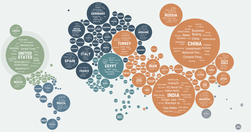
Search engines, social media and news aggregators are great at surfacing information close to our interests, but they are limited by the set of topics and people we choose to follow. Even if we read multiple news sources every day, what we discover is defined by the languages we are able to read, and the topics that our sources decide to cover. Ul…
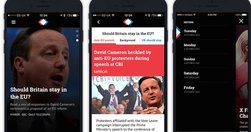
... manually curate 10 stories from other publishers, which will run as a daily edition. Three different articles, often with opposing viewpoints, will run on each story, representing the left, neutral and right-wing political perspectives on the same story... For example, in Wednesday’s edition, it ran a Guardian story entitled “Terrorism publ…

It’s easy to underestimate how much of the media you’ve consumed was shaped by the “like” button... whispers suggest that the company is not, in fact, launching a simple “dislike” button, but something that conveys empathy.... it’s safe to say there will be consequences... When Facebook broadens the scope of the emotional-response buttons, t…
Blogging has never been easier but getting read has never been harder... The problem isn't freedom or openness but distribution... you might post it on Facebook or Google Plus. Your friends might see it ... (though this is largely random) and they might share it ... You might post it on LinkedIn and your network might see it ... and LinkedIn migh…

IN RESPONSE TO The Web We Have to Save... Unlike a blogger, it’s very hard to isolate and ban Facebook or Twitter. A blogger can be placed in jail, a network of people on a platform with millions of users is much harder... [BUT] these platforms have their own censorship mechanisms... Facebook is doing better now but ... many things were bloc…
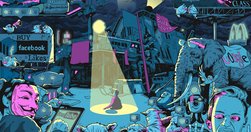
The rich, diverse, free web that I loved - and spent years in an Iranian jail for - is dying.Why is nobody stopping it?... The hyperlink was my currency six years ago... represented the open, interconnected spirit of the world wide web ... a way to abandon centralization ... and replace them with something more distributed, a system of nodes an…
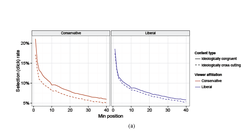
"usually, researchers are at a pains to highlight their findings. This one buries them as deep as it could, using a mix of convoluted language and irrelevant comparisons... this study is not about all of Facebook users, despite language ... that’s quite misleading: “Finally, we conclusively establish that on average in the context of Facebook…”…

Great takedown of the flaws and bad framing of the Facebook filter bubble study in Science: "Alarm bells are ringing for me. The tobacco industry might once have funded a study that says that smoking is less dangerous than coal mining, but here we have a study about coal miners smoking... the article’s strange comparison between “individual…

FiltreBubble author on Facebook's study in Science: "Facebook’s data science team has put part of the “filter bubble” theory to the test ... Upshot: here is a real and scientifically significant “filter bubble effect” — the Facebook news feed algorithm in particular will tend to amplify news that your political compadres favor... For self-de…
"Skeptics are howling that this is a Faustian bargain—that the media are mortgaging their long-term futures for short-term gain... Facebook has presented the news media with a collective-action problem. News sites aren’t blind.... if they could all get together and decide, as a group, what to do about Facebook, no doubt they’d think long and hard…
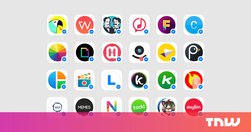
"The problem is that Facebook controls what you see and when. If it becomes the primary way to consume news and watch videos, what happens when a news story is controversial about the company itself? Or isn’t within its content guidelines (like pornography)? You’ll be receiving a filtered version of the internet that’s controlled by one company."

"The New York Times is preparing to plant a taproot right inside the highly walled garden that is Facebook." - Memo To Publishers: Watch Where You Put That Taproot… — Medium
Personally I've been creeped out by all this since reading the Filter Bubble, but apparently I'll be feeling less lonely about it next year. Great image here: "Think of a world in which your phone constantly checked in with the central phone company to decide which of your relatives it should allow you to call, and to jumble their sentences aroun…
One thing I'm not hearing is whether website owners will be able to use Atlas data to customise their user experience. "Atlas will allow marketers to tap its detailed knowledge of its users to direct ads to those people on thousands of other websites and mobile apps.... Facebook has deep, deep data on its users. You can slice and dice markets, l…

"Facebook seems to be trying to get more transparent about how the algorithms ... function, with a statement on Monday about cracking down on “clickbait.” ... But despite the attempts at openness, the bottom line remains the same: Facebook is a black box. No one really has any clue why the site chooses to show or hide certain content... what com…

A new angle on the filter bubble: Facebook's ""Report Abuse" button, which is used to flag content that's hostile or inappropriate ... can also be used as a tool for stifling dissent... If you swarm a page or a person with enough abuse reports, you can kick them off Facebook. Pro-government forces in Vietnam have learned how to do it, and they’re…

Interesting & contested view of that Facebook study, by its co-author: ""If you say, 'I don't want to be experimented on,' ... what does that mean?"[Google is ] constantly needing to tweak their algorithm. If I say, 'I want to opt out of that,' does that put me back to Google search 2004? " Others beg to differ: "It's not A/B testing. It's just b…

Seems that, 3+ years after "The Filter Bubble" was pubished, it takes an event like #Ferguson to make people realise what it is. "if there was no Twitter to catch on nationally, would #Ferguson ever make it through the algorithmic filtering on Facebook? ... or be buried in algorithmic censorship?... Facebook has become like a digital version of…

"relying too heavily on Facebook’s algorithmic content streams can result in de facto censorship. Readers are deprived a say in what they get to see, whereas anything goes on Twitter." Puts some numbers to the opacity of the filter bubble experienced by Facebook users in comparison with Twitter users, by comparing coverage of #Ferguson and 'Ice B…
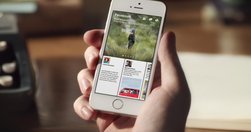
Seems Zuck's taken Filter Bubble criticisms to heart, combining human & machine curation (now where have I heard that before?) to create what Techcrunch calls “content serendipity” (wish I'd coined that one): "Each Section combines stories chosen by Facebook’s human editors and surfaced by the Paper algorithm [from] a publication, blogger, publi…
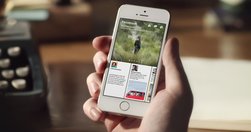
"You also can't add any site you want, as with a traditional RSS reader. Instead, Facebook has hired a team of content curators to pick stories for you in one of a dozen or so categories ranging from basic news to cute animals." - With Paper, Facebook just blew its own iPhone app out of the water | The Verge